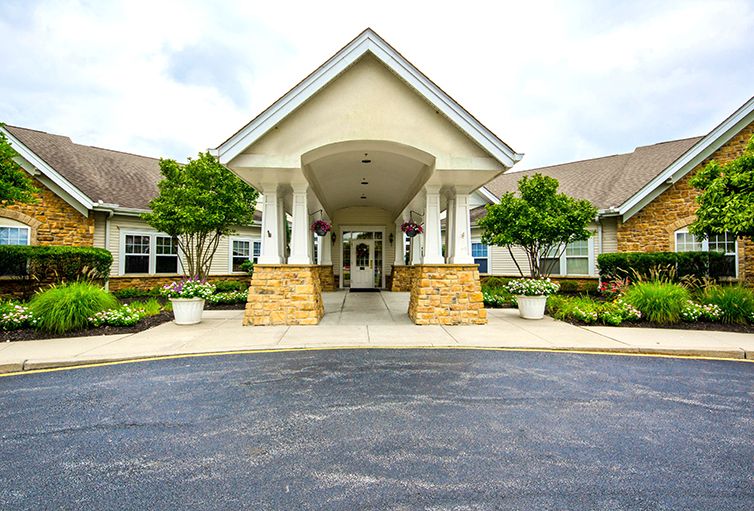Boutique Memory Care Environments That Nurture and Comfort
Boutique Memory Care Environments That Nurture and Comfort
Blog Article
All About Memory Care Services: Why Small Memory Care Homes Are an Excellent Option
Memory care solutions play a vital function in sustaining individuals with Alzheimer's and dementia. Tiny memory care homes attract attention for their tailored method and intimate setting. With reduced staff-to-resident proportions, these homes cultivate more powerful links and customized care. Homeowners take advantage of enhanced social communications and a safe atmosphere. As families discover options, comprehending the special advantages of small memory treatment homes becomes crucial. What factors should be thought about when selecting the ideal home?
Recognizing Memory Treatment Provider
While lots of might recognize with general senior treatment options, understanding memory care services is important for family members facing the obstacles of cognitive decrease. Memory care especially provides to people with conditions such as Alzheimer's condition and other kinds of mental deterioration. These services provide an organized atmosphere that focuses on improving the high quality of life for locals through specialized treatment and support.Memory treatment facilities are made to ensure safety and security, usually including safeguarded atmospheres to avoid straying. Educated team member are readily available around the clock to aid with daily activities, drug management, and individual care. Furthermore, memory care programs usually include cognitive stimulation activities, tailored to engage citizens and promote psychological health. Households can take advantage of understanding these solutions, as they allow informed decisions regarding their enjoyed ones' care, making sure that their particular needs and preferences are dealt with in a supportive and thoughtful manner.
The Advantages of Small Memory Treatment Homes
Tiny memory treatment homes offer distinctive advantages that can considerably boost the quality of life for homeowners with cognitive problems. One considerable advantage is the intimate environment, which permits personalized communications among staff and residents. This smaller setup cultivates significant connections, minimizing feelings of seclusion and anxiousness commonly experienced by people with memory issues.Additionally, the lower staff-to-resident proportion in small memory treatment homes allows caretakers to supply even more attentive guidance and assistance. This technique not only boosts safety yet also promotes a complacency for the residents.Moreover, tiny memory care homes can adjust quickly to the unique needs and preferences of each citizen, permitting an extra homelike environment. Such a setting can motivate social interaction and participation in activities, eventually enhancing the daily experiences of those living with cognitive impairments.
Personalized Treatment Plans for Homeowners
Customized care plans are crucial in memory care homes, as they satisfy the one-of-a-kind needs and preferences of each homeowner. These plans start with thorough analyses conducted by knowledgeable specialists, who assess cognitive capacities, case history, and personal passions. This customized strategy guarantees that care is not just effective but also respectful of each individual's self-respect and autonomy.Moreover, customized treatment plans are adaptable, enabling adjustments as homeowners' needs advance in time. This flexibility fosters a feeling of security and knowledge, which is crucial for individuals dealing with memory challenges. Caregivers are trained to execute these strategies constantly, offering support that lines up with the homeowners' routines and preferences.Ultimately, individualized treatment strategies boost the lifestyle for citizens by advertising independence, well-being, and involvement, making them a fundamental element of memory care services in tiny memory treatment homes.
Developing a Home-Like Environment
Creating a home-like atmosphere is essential for promoting comfort and experience in memory care settings, as it substantially affects locals' emotional well-being. Little memory care homes commonly prioritize personalized touches, such as warm shade combinations, household images, and familiar furnishings arrangements, which aid homeowners feel more secure. Incorporating aspects evocative a standard home, like cozy space and communal areas, motivates a feeling of belonging.Moreover, utilizing natural light and exterior spaces can improve the environment, promoting relaxation and harmony. Team members play a significant duty in maintaining this setting by involving with locals in a thoughtful way, treating them like household. Routine activities, such as food preparation or gardening, can additionally add to a home-like feeling, using chances for locals to take part in meaningful experiences. Overall, creating a nurturing setting supports cognitive feature and emotional security, making it a vital aspect of memory care services.
Boosted Social Communication and Neighborhood
Boosted social communication and area are important components of memory care services. By promoting personalized social interaction and creating a family-like atmosphere, these services advertise meaningful connections amongst locals. Group activities and occasions even more encourage engagement, aiding people really feel more consisted of and sustained.
Personalized Social Engagement
While social interaction is vital for overall wellness, many individuals with memory impairments typically battle to engage meaningfully with others. Individualized social involvement in memory care homes addresses this challenge by developing customized tasks that deal with homeowners' special interests and abilities. By concentrating on individual preferences, caretakers can foster connections that reverberate deeply with each individual. Activities such as art treatment, songs sessions, and guided discussions advertise cognitive stimulation and emotional expression. In addition, small group settings urge sociability and permit for even more intimate interactions, improving sensations of belonging. This approach not only deals with feelings of seclusion but likewise encourages locals to preserve a feeling of identity, eventually contributing to enhanced psychological health and lifestyle.
Family-like Environment
In a memory care setting, promoting a family-like atmosphere significantly boosts social interaction and builds a sense of area amongst residents. Smaller memory care homes commonly prioritize intimate environments, permitting citizens to develop closer links with one an additional and personnel. This nurturing atmosphere promotes count on, which is vital for people with memory disabilities. Locals are most likely to talk and share experiences, developing an encouraging network that minimizes sensations of loneliness. The experience of common rooms and routines adds to a sense of belonging, even more motivating social interaction (personalized memory care). In such setups, emotional bonds prosper, bring about boosted total health and a higher top quality of life for citizens as they browse their day-to-day experiences together
Group Activities and Events

Safety and Safety Attributes in Tiny Homes
Numerous small homes made for memory care integrate crucial security and security functions to guarantee the wellness of residents. These homes commonly use secure entry and departure indicate prevent roaming, a common worry among people with memory disabilities. Additionally, surveillance systems and alarm devices boost monitoring, guaranteeing see this page that personnel can promptly reply to any kind of unusual activities.Interior layouts are tailored for safety, with decreased hazards such as sharp corners and clutter-free pathways. Handrails and non-slip flooring are generally installed to reduce the risk of drops. Personnel are educated in emergency procedures, guaranteeing they are gotten ready for various situations.Moreover, customized care plans might include evaluation of individual security demands, supplying customized remedies for every resident. In general, these safety and security and protection functions develop a caring atmosphere where locals can grow while preserving their self-respect and independence.
How to Select the Right Memory Care Home
Just how can families ensure they pick the most appropriate memory treatment home for their enjoyed ones? The choice calls for cautious consideration of a number of factors. Families should assess the facility's staff certifications and training, ensuring that caretakers are experienced in taking care of memory-related conditions. Next, it's essential to examine the home's atmosphere, concentrating on safety and security functions and whether it cultivates a feeling of community and belonging. Going to the center can provide insight into daily tasks and the social Clicking Here ambience, which are important for mental stimulation and emotional well-being. Furthermore, families should ask about the treatment plans used, guaranteeing they are tailored to individual needs. Ultimately, taking into consideration the home's location and availability for family members brows through can add to a smoother change. By dealing with these elements, family members can make an enlightened choice that prioritizes their enjoyed one's comfort and quality of life in a memory treatment setting.
Often Asked Inquiries
What Credentials Should Staff Members in Memory Treatment Residences Have?
Team member in memory care homes ought to possess appropriate certifications, experience in dementia care, solid communication skills, and concern. Continuous training in behavior management and therapeutic interventions boosts their ability to support residents successfully.
Just How Do Memory Treatment Services Differ From Traditional Assisted Living?
Memory treatment services focus particularly on individuals with memory disabilities, giving customized assistance and structured environments. In contrast, traditional assisted living uses general aid with everyday activities, lacking the customized strategy essential for those with cognitive obstacles.
What Sorts of Tasks Are Offered in Memory Treatment Houses?
Memory treatment homes generally provide a variety of activities made to involve locals. Common choices consist of art treatment, songs sessions, cognitive video games, exercises, gardening, and gatherings, all focused on boosting health and cognitive feature.
Can Locals Bring Their Own Personal Belongings to Memory Treatment Homes?
Locals can usually bring their very own belongings to memory treatment homes, enabling them to individualize their home - personalized memory care. This technique assists produce an acquainted setting, advertising comfort and a feeling of identification for the individuals

Exactly How Are Relative Associated With the Care Process?
Family members play a necessary duty in the care process, often taking part in decision-making, attending care meetings, and offering psychological support. Their participation promotes a collective atmosphere, boosting the resident's general well-being and lifestyle. While numerous may be familiar with general senior treatment choices, recognizing memory care solutions is necessary for households dealing with the challenges of cognitive decline. These solutions offer an organized setting that concentrates on enhancing the high quality of life for residents via specialized treatment and support.Memory treatment centers are made to ensure safety and security and protection, frequently featuring safeguarded atmospheres to stop roaming. Individualized treatment strategies are important in memory care homes, as they cater to the special requirements and choices of each resident. Personnel participants in memory care view it now homes should possess pertinent certifications, experience in dementia treatment, strong communication abilities, and compassion. Memory care solutions focus specifically on individuals with memory problems, offering customized assistance and structured settings.
Report this page